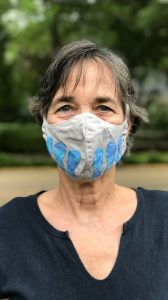Nope. By no means. No way. No. We are not there yet.
When I was a kid, my (large) family drove places in a station wagon. Three people were in the front seat, three in the middle seat, two or three in the rear-facing back seat, and one or two in the tiny space between the second and third seats. Luggage was on top of the car, wrapped in a tarp and tied on with ropes, or if we were towing the motorboat, the luggage was stowed in the bow.
We drove from Jackson to Oxford for weekends to visit my father’s parents. We drove to Key West. We drove across Canada to Oregon and down the coast of California. We drove from Jackson to Sunapee, New Hampshire, to visit my mother’s parents.
In a crowded station wagon on a long car trip, there are rules by which one must abide. Stay in your own space. Don’t pinch, punch, tickle, crowd or torment the person next to you verbally, mentally or physically. Don’t pass gas.
These COVID days, it feels a bit as if we are on a long car ride in a crowded station wagon. The worst thing about this car trip is that we don’t know when it will end. Are we driving to Oregon or round and round Canada? If we are driving to New Hampshire for the summer, have we passed Meridian yet?
In the middle of this uncertainty as to how long the pandemic will last, rules can help us. Good behavior can lessen the duration of the pandemic, just as good behavior in a packed car makes the trip go by faster. Living within and abiding by a set of rules lessens anxiety, because we know we are doing everything we can to control our future.
Mask-wearing and social distancing are key.
Forget about what you think wearing a mask says about your politics. The reasons behind mask-wearing are medical.
Wearing a mask protects other people from your sneezes, coughs, speaking and exhaled breaths. Every time you exhale, especially if the exhalation is forceful, you send germs into the air. A mask will trap some of those respiratory droplets and aerosolized germs and keep them from reaching another person.
No one can tell who is sick and who is well. You may be carrying SARS-CoV-2, the coronavirus that causes COVID-19, asymptomatically or you might become sick tomorrow from the virus that is already in your throat, nose and nasopharynx. Wearing a mask will keep you from passing an infection on to the people around you.
You wear a mask to protect the people around you. It also helps protect you from the exhaled breath of others.
If you look in a mirror while wearing a mask and see nostrils or lips, you are not wearing the mask correctly. If the nostrils can be seen, air is being exhaled from the nostrils into the surrounding air outside the mask, and germs are being spread. If the mask is worn around the neck so that both the nostrils and the lips can be seen, you might as well leave the mask off, as you are exhaling germs via the mouth and the nose.
Don’t be surprised if others walk away from you when they see you coming. They are trying to protect themselves by remaining socially distant.
People in Taiwan, Hong Kong, China and the Czech Republic have worn masks faithfully when asked, and the SARS-CoV-2 virus has been managed in these countries much more effectively than we have managed it in the U.S. Let’s be open to learning from people in other countries.
And let’s not be so self-centered that the inconvenience of mask-wearing outweighs lessening the risk of infecting people around us.
We are better than this.
Mississippians are known to be generous, charitable givers. Let’s be generous in our mask-wearing, and we can get there together.
Dr. Jean G. Gispen is a staff physician at the employee health center within University Health Services at the University of Mississippi.
